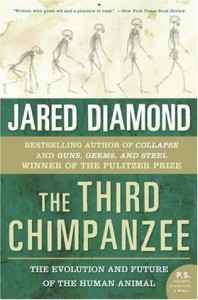 In The Third Chimpanzee, Jared Diamond wears many hats – historian, anthropologist, zoologist, environmentalist, evolutionary biologist and geographer – to tell the story of mankind, from our differentiation from other primates, characterized by the evolution of larger brains capable of making use of tools and, eventually, language, to our expansion across all the habitable continents. It’s a fascinating history, and not merely because it’s our own. Where we came from, our animal origins, has profound implications for who we are today and where we might be headed, and if we ever hope to control our fate in any meaningful way, to repair international conflicts or slow down or even reverse the pillaging of our habitat, we’d do well to understand ourselves first.
In The Third Chimpanzee, Jared Diamond wears many hats – historian, anthropologist, zoologist, environmentalist, evolutionary biologist and geographer – to tell the story of mankind, from our differentiation from other primates, characterized by the evolution of larger brains capable of making use of tools and, eventually, language, to our expansion across all the habitable continents. It’s a fascinating history, and not merely because it’s our own. Where we came from, our animal origins, has profound implications for who we are today and where we might be headed, and if we ever hope to control our fate in any meaningful way, to repair international conflicts or slow down or even reverse the pillaging of our habitat, we’d do well to understand ourselves first.
The battle for human nature precedes Jared Diamond. It precedes even the scientific disciplines he practices. Long before we had conceived of the atom, the neuron or the gene, philosophers were debating what, exactly, it means to be human, what aspects of our behavior are “natural” and which are “learned.” Whole social systems, laws, religions, societies and doctrines are founded on differing conceptions of the human, and the quest for a just society is inextricably bound up with questions of human nature. Is self-interest in our nature? Is crime? Or are these merely symptomatic of social inequalities? Evolutionary science has the distinction of being equally disdained by the left and the right, largely because it undermines sacred cows in both camps. “The claims of experience,” writes Schiller, “refute all the well-meaning attempts of philosophy to bring what the moral world demands into harmony with what the real world does.” But we live in the real world, and our “philosophy,” our social and political policy, must be judged on its effectiveness rather than the good intentions of philosophers.
If this sounds hopelessly vague, Diamond is unfailingly specific. From animal cruelty to our dating (mating?) habits, from environmental policy to geopolitics, he traces with aplomb our animal nature’s influence on our decision making. It is his hope, and mine, that first by acknowledging and then by understanding this influence, we may one day transcend it.